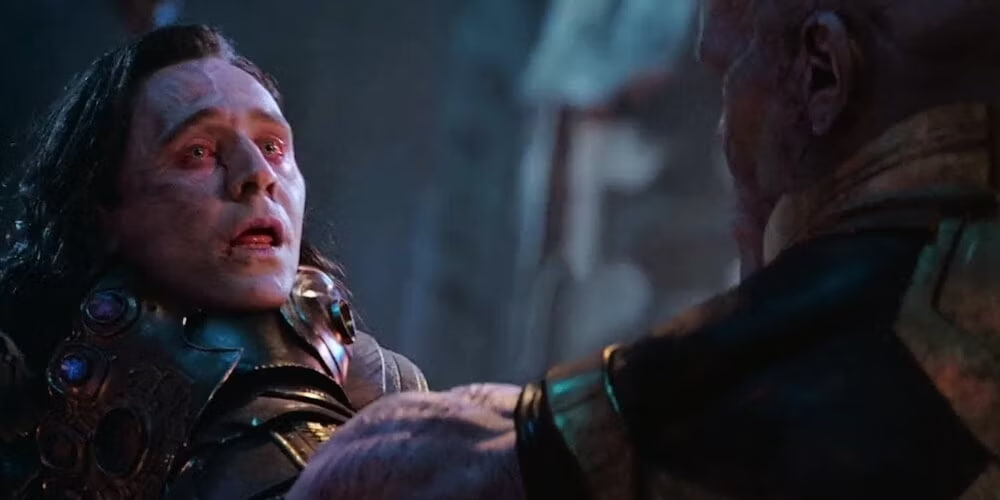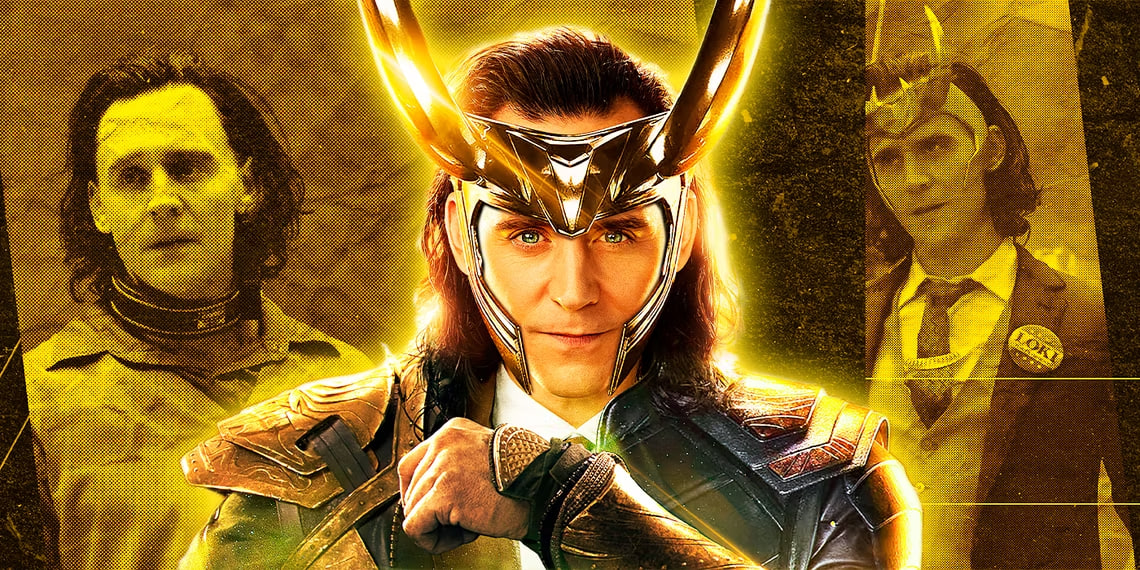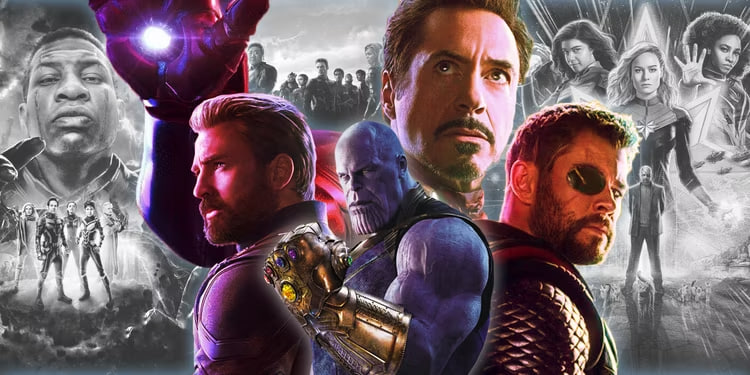Loki’s climactic death at the beginning of Avengers Infinity War may have solidified the fate of the MCU. But, with Loki, looks are always deceiving.
Fans and critics of the Marvel Cinematic Universe have explored the state of the franchise as box office numbers struggle and a cultural undertone of superhero fatigue seeps in. While many still love and commend powerful industry juggernauts like the MCU, there will always be fans who find the franchise may have run its course following the conclusion of The Infinity Saga. To see such a decline is, as MCU villain Thanos would put it, inevitable, but the question remains of what exactly caused this shift.
When analyzing the ups and downs of franchises as massive as the MCU, it is often too broad a fluctuation in popularity to pinpoint one or two particular moments that spelled out the franchise’s decline. And while this struggle holds merit, it might not be as impossible as some fans would believe at first glance. Although it also resulted in a series that has acted as the peak of this era of the franchise, one narrative decision in Avengers: Infinity War might also be directly responsible for the franchise’s loss of focus, illuminating the biggest pitfalls of what was once an untouchable franchise: the death of Loki.
Loki’s Death Sends a Questionable Message After the Events of Thor: Ragnarok

Before his death, Loki promised Thor that the sun would shine on Asgard once again; however, whether or not that has actually come to pass remains to be seen.
In the opening moments of the long-anticipated Avengers: Infinity War, fans were appalled to witness the death of the fan-favorite god of mischief, Loki, at the hands of the film’s antagonist, Thanos. From a microscopic view, considering only the narrative elements that shape Infinity War as a standalone project, this is a solid way of setting the scene and showing audiences just how brutal Thanos’ wrath will be throughout the runtime of the film and beyond. And while it certainly sent this threatening message, it also seemed to quietly undermine the events of Thor: Ragnarok, a film that directly led to this near-final chapter of the Infinity Saga.
Taika Waititi’s 2017 Thor: Ragnarok concluded the original Thor trilogy with an optimistic message marked by the people of Asgard evading Surtur’s wrath and heading onward towards the unknown. This unknown would shortly reveal itself to be Thanos and a distasteful amount of death as half the remaining population of Asgard would be wiped out and, as the blood-drenched cherry on top, so would Loki. Again, this serves as a fittingly dark opening to Infinity War, but it does so at the cost of Ragnarok’s entire thesis. While some fans were uncomfortable with this narrative decision, most simply brushed it off and indulged in the rest of the movie without giving it a second thought. The true tragedy of this story decision is a lot more nuanced than it appears, as it sends a startling message about the franchise’s direction from this point onward.
In its earliest days, the MCU thrived on self-contained stories that served themselves and then hinted at a thing or two to be picked up in subsequent films. Eventually, this formula wouldn’t satisfy the pace with which the franchise wished to multiply, so the set-ups became center stage as the Infinity Saga reached its conclusion with Infinity War and Endgame. Now, as the Multiverse Saga continues to awkwardly unravel, both tactics have been seemingly abandoned. In an attempt to refocus the trajectory of the franchise, Phases 4 and 5 of the MCU have opted for incredibly self-contained stories, completely neglecting the overarching narrative that made the franchise such a success in the first place. In some ways, this is a positive angle to view things, but in most ways, it marks a tragic end to the franchise’s streak of unbeatable storytelling. Still, this is a big-picture decision-making process that will continue to evolve, and only time will tell if this is a good direction for the longevity of the franchise.
Loki’s Death and Rebirth Were Blessings in Disguise – But Such Risks Might Not Always Pay Off

The MCU’s Phase 4 was more about trying new things than playing it safe, which led to mixed results.
While Loki fans would remain heartbroken for years, a sliver of hope would be given to Tom Hiddleston’s strongest admirers when Loki resurfaced in the time-traveling escapades of Avengers: Endgame, making a hasty getaway with the Tesseract in the middle of the Avengers’ unfocused time heist. This promised a compelling future for the character, and whether or not it was the franchise’s intentions from the get-go, this one-off moment would act as the catalyst to one of the MCU’s highest achievements in its history. The Disney+ original series Loki would play off of this moment as the Time Variance Authority stepped in to fix the deviation caused by Loki’s escape, kickstarting two seasons of television that many fans regard as a highlight of the modern MCU era.
After Loki’s Series Finale in 2023, fans have been allowed to reflect on the narrative choices that led the character and the franchise down this path and weigh the pros and cons of their outcomes. Although the main timeline of Loki’s death in Avengers: Infinity War remains a let-down in the short term, it also oddly adds to the gravitas of new Loki’s redemption. With the conclusion of Loki Season 2, Loki takes up the mantle of overseeing the Sacred Timeline and the Multiverse, a fitting end to the character arc both versions of the character had been experiencing since 2011. To many, this was a conclusion as fulfilling as the franchise had ever seen, making the difficult narrative choices that led up to it worth every ounce of suffering. And in the specific case of Loki’s character arc, this carries a lot of truth.
Beyond Loki, however, the problem remains: the MCU was ready and willing to sacrifice a beloved character. While many fans wouldn’t notice the implications of this choice, many would notice the results of similar decisions. As the franchise has moved further and further in many directions at once, it’s focus was more confusing than ever. The best Phase 4 and 5 MCU projects have been able to stand on their own while also offering something fresh to the universe, like She-Hulk: Attorney at Law, Werewolf by Night, and the recently released and criminally underrated The Marvels. Moving into the next era of the franchise, it needs to rebuild trust between the powers that be and fans: lean into the unpredictable while also promising fans that the stories they’re being told will continue to matter as the franchise evolves.
Loki’s Death Was the First Contraction in the Birth of a New Era For the MCU

Even after his Sacred Timeline death, the Multiverse Saga couldn’t have happened without Loki.
Crafting a franchise as broad and ever-expanding as the Marvel Cinematic Universe is no small feat, and it remains impressive just how long the franchise was able to deliver consistently satisfying projects. Still, it was always inevitable that the franchise would lose its footing even slightly. And while it still has its roaring successes with movies like Spider-Man: No Way Home or the aforementioned mastery of both Loki seasons, if it hopes to survive the second half of the decade with its reputation intact, the MCU needs to refocus itself. This requires an expert balance between standalone projects and overarching themes and end goals. Whether or not this feat is something the franchise can, at this point, accomplish is still up for debate.
The good news is that, ultimately, Loki’s death was the catalyst for this new era, not a final nail in the coffin. By ripping the band-aid off and showing fans the lines Marvel was willing to cross, both at the conclusion of the Infinity Saga and beyond, Infinity War proved that the future was one that existed with or without the characters had come to hold so dear. Even when these characters were killed off, like in Loki’s case, this would not necessarily be the end of their stories. As seen in Loki, new meaning can be given to characters that fans thought had already reached their peak. Especially by the time the series draws to a close, it is evident that Loki taking the mantle of God of Stories has solidified this era of the MCU as not just a place for the birth of new characters but also for the rebirth of old ones.
However, this isn’t inherently a problem, as fans of the MCU and its strongest investors can rest assured that the world’s thirst for superhero media will never be entirely quenched. There’s a reason these narratives have stood the test of time and continue to evolve. But there’s also a reason the MCU soared so brilliantly in the first place: it was an anomaly. A one-off. A fresh start. The MCU’s best bet is to recuperate and relaunch, taking things slowly and rebuilding the fanbase it has slowly lost. No reboots are needed, only the good old-fashioned pacing that keeps fans anxious for the next chapter instead of overwhelmed at just how far behind they’ve fallen.


